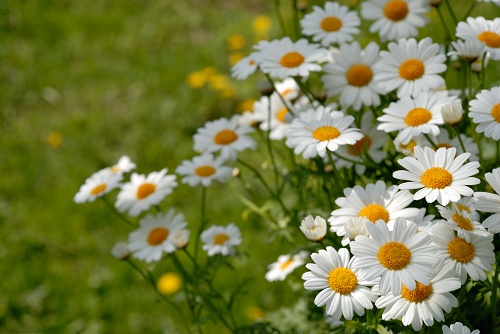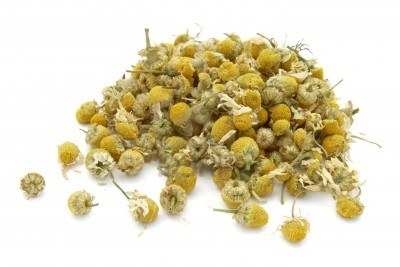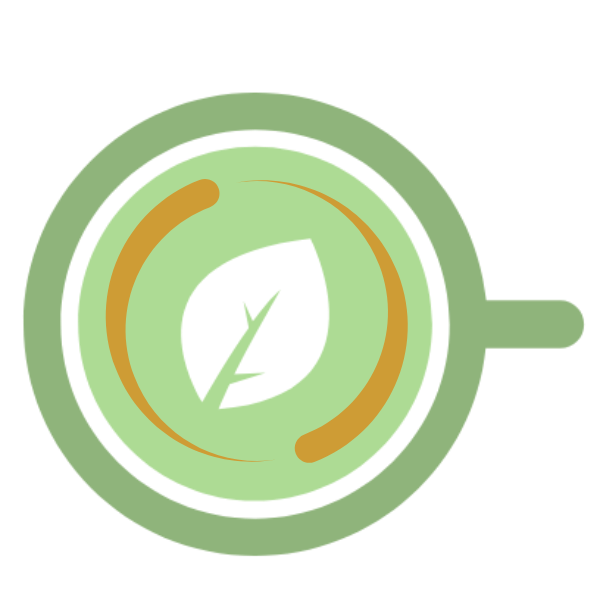

Latin Name
chamomilla recutita; matricaria recutita; chamaemelum nobile; matricaria chamomilla; anthemis nobilis.
Common Name
Roman Chamomile; German Chamomile (aka Hungarian Chamomile – is more popular and is thought to have greater healing powers); Manzanilla (Spanish); Maythen (Saxon); True Chamomile. AKA the “All Around Comforter”.
Botanical Name
Anthemis nobilis (Roman); Matricaria recutita (German)
Origin
British Isles, Europe, Russia and Asia. It often grows near roadsides, around landfills, and in cultivated fields as a weed because the seeds need open soil in order to survive.
Part Used
The flowers and herb.
Brief History
The use of chamomile can be dated back to the ancient Egyptians and because they regarded it as such a powerful healing plant, they dedicated it to their gods. Today, it is still considered as one of the “heal all” remedies of the herbal world. The Greeks called it chamaimelon meaning “ground apple” due to its apple-like scent and the Spaniards called it manzanilla meaning “little apple”.
It is one of the oldest and most favoured garden herbs and is still known as the “medicinal plant”. In the past, it was regarded as the “Plant’s Physician” meaning if other plants in the garden were looking weak and dreary, they will recover if chamomile was planted near it!
When walked on, it produces a strong and fragrant scent and for this reason it was used as an aromatic stewing herb during the Middle Ages. Today, it can still be used in cookery and added into salads for colour and flavor.
Medicinal Uses & Properties
Anti-Inflammatory
* Chamomile has been found to contain fairly strong anti-inflammatory ingredients and is particularly effective in treating stomach and digestive problems such as menstrual cramps and Irritable Bowel Syndrome (IBS). Externally, it can be applied alone or with other herbs as a compress to relieve pain, swellings, inflammation and neuralgia.
Relaxant
* It also contains anti-spasmodic properties which means it relaxes the smooth muscles that line the digestive tract and uterus, to help ease an after-meal stomach-ache or help soothe the ‘time of the month’ cramps.


* Chamomile can be used to aid sleep, help combat insomnia, sleep disturbances, and anxiety as it is a natural sedative. A chemical found in the plant called apigenin calms the central nervous system and can soothe frayed nerves before bedtime and make it easier to drift off to sleep. Because of its powerful soothing and calming effects, it is safe to use on irritable babies and restless children.
Antiseptic
* It has strong antiseptic properties which makes it invaluable to treat burns, rashes, skin irritations, infections, heal minor wounds and reduce swelling in the form of an ointment. It can treat flatulence, bring relief to sufferers of arthritis (as can reduce the stomach eroding effects of painkillers and other related drugs) and can be used as a mouthwash to soothe gingivitis (inflammation of the gums), help fight gum disease and speed up the healing of mouth ulcers.
Other uses
* In the past. an infusion of chamomile herbal tea can be an effective remedy for treating hysterical and nervous conditions in women and also promote menstrual discharge.
* Generally good for skin and hair, chamomile can be infused into creams and shampoo and blended into oils for aromatherapy. As a lotion, it can be applied to ease toothache, earache and neuralgia.
Prepared As
decoction; infusion; herbal tea blend; fluid extract and essential oil.


Possible Side Effects
* Chamomile is part of the Asteraceae plant family, which includes ragweed, asters and chrysanthemum. If you are allergic to plants from this group, then it’s best to avoid chamomile altogether.
* Although highly recommended for pregnant women by health professionals who work with herbs, high doses can cause allergic reactions, can stimulate uterine contractions, could cause miscarriages and premature labour.
* Chamomile contains the chemical coumarin, a naturally-occurring compound with anticoagulant (blood-thinning) effects so shouldn’t be taken with blood thinning drugs such as aspirin, heparin and warfarin.
————————————————————————————————————————
This website is for educational and informational purposes only. The publisher/owner of blendingherbaltea.com is not legally liable for your use of the information which is not intended to diagnose, treat, cure or prevent any disease. If you have any serious health concerns, you should always check with your health care practitioner or medical herbalist before self-administering herbs.
